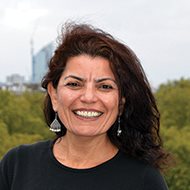Project summary
Resulting from war in Syria, 650,000 and 1 million Syrian refugees have been displaced in Jordan and Lebanon respectively and have been living in vulnerable socio-economic circumstances. Literature on gender differentiated coping mechanisms undertaken by Syrian refugees provides evidence of the reconfiguration of gender, in which the women act as the primary family provider whilst the men are mostly jobless. This research will explore how gender reconfiguration, as a means of resilience, may create a crisis of gender identity. The research will also examine the link between the gender identity crisis and the return to religion as a means of resilience.
This is a 30 month research project to be implemented in Jordan and Lebanon. The research sample consists of 120 Syrian refugee men and women, 60 in each country. The research relies only on qualitative methods, aiming to understand the life experience of poor refugee women and men. The outcomes of the research include publishing two country research papers with policy recommendations in the IGA website and an article in a peer reviewed international journal.

Dr Aitemad Muhanna-Matar
I am an Assistant Professorial Research Fellow at the LSE’s Middle East Centre currently working on a research project investigating the gender impact of Syrian displacement in Jordan and Lebanon.
In 2014-216, I conducted a research on Tunisian Salafi youth and the driving factors of their radicalization. In 2013, I managed a regional research project in five Arab countries on Women’s political participation across the Arab region: Mapping of existing and new emerging forces in the region. In 2010-2013, I studied the historical trajectory of Gazan women’s religiosity, agency and subjectivity, drawing on different discourses of religion and secularism.
My PhD thesis in 2010 examines the effects of the Palestinian Second Intifada on women’s agency. My thesis was published in a book ‘Agency and Gender in Gaza: Masculinity, Femininity and Family during the Second Intifada, by Routledge (2013). In the period 1996 to 2008, I was working as a consultant with the World Bank, UNDP, UN Women, Oxfam-GB and Save the Children based in the Palestinian Occupied Territories.
My consultancy work was concentrated on themes of gender mainstreaming, poverty reduction, good governance, capacity building, partnership, monitoring and evaluation and youth development. I have also garnered substantive experience in policy analysis and development planning through my work as a policy advisor for the Palestinian Ministry of planning. I contributed as a senior gender researcher to the production of the annual Palestinian Human Development Reports (PHDR) during the period 1998-2006.
-
Zelal Başak Kızılkan (February 2020): Turkey’s Resilience-Building Strategies for Syrian Refugees in the Field of Higher Education
-
Gendering the Triangular Relationship between Vulnerability, Resilience and Resistance: The Experiences of Displaced Syrian Refugees in Jordan. Published by HURST Books.
-
Syrian Men’s Disability and their Masculine Trajectories in the Context of Displacement in Jordan and Turkey – a revised version resubmitted to the International Journal of Middle East Women’s Studies;
-
The Methodological and Ethical Dilemmas of Studying the Resilience of Syrian Refugees. Submitted to the journal of refugee Studies.
-
My Body is here and My Soul is Still there in Syria: The Emerging Performative Gender of Displaced Syrian Women in Southeast Turkey, an article to be published in a special issue journal by City Dublin University in fall 2020;
-
The Missing Masculinity in the Discourse of International Humanitarian Aid to Displaced Syrian Refugees, a piece published on the LSE Middle East Centre blog.
-
Refugee Resilience Series on the LSE Middle East Centre Blog: this online series was produced as a follow up on the project’s workshop conducted 7-8 March 2019. Workshop participants contributed a piece based off their presentations, and helped enhance understanding of the workshop themes in a way that is relevant to a wide readership
-
A paper by Zelal Basak Kizilkan from Mardin Artuklu University will be published by the LSE Middle East Centre. It will be titled ‘Turkey’s Resilience Building Strategies for Syrian Refugees in the Field of Higher Education’ which looks at Turkey’s resilience building plan in the field of education, opportunities and challenges that Syrian students face, including language, academic and financial barriers, as well as legal and bureaucratic issues.
-
A conference organised by LSE Middle East Centre, titled ‘Between Institutional Resilience to the Syrian Crisis and the Resilience of Refugees’. The conference featured 20 speakers working in academia, government, and non-profit organisations with refugees, were invited from across Europe and the Middle East. A total of 115 registered for the two day conference (7-8 March 2019)
-
Aitemad Matar presented research findings at a workshop titled Navigating Displacement and Humanitarian Responses: Discourses and Experiences of Syrian Refugees and Aid Providers in Jordan. The workshop was organised by the Department of Anthropology at Amsterdam University (15-16 March 2019).
-
Aitemad Matar presented a paper titled Gendering the Triangular Relationship between Vulnerability, Resilience, and Resistance: The Experiences of Displaced Syrian Refugees in Jordan at a workshop on the non-material dimensions of protracted displacement. The workshop was organised by the Department of Geography at King’s College London, with audience members representing international NGOs and humanitarian organisations targeting refugees worldwide (26 March 2019).
-
Aitemad Matar presented research findings on the dynamics of resilience to humanitarian crisis among Syrian refugees in Jordan and Turkey, at the 5th China and MENA Conference that took place at Shanghai University, China (17 –18 May, 2019).
-
Aitemad Matar presented a paper on the resilience of Syrian refugees in Jordan in a workshop on ''Livelihoods and Economic Inclusion of Syrian Refugees in Host Countries,'' organised by the Christ Church College, Oxford Department of International Development at University of Oxford (14 June 2019).
-
Aitemad Matar participated at a workshop organised by Dublin City University to present a research paper on the emerging gender performativity within the context of displacement. Seven researchers from USA, Europe and the Middle East joined the workshop to discuss issues related to gender, displacement, resilience and resistance (25-26th November 2019).